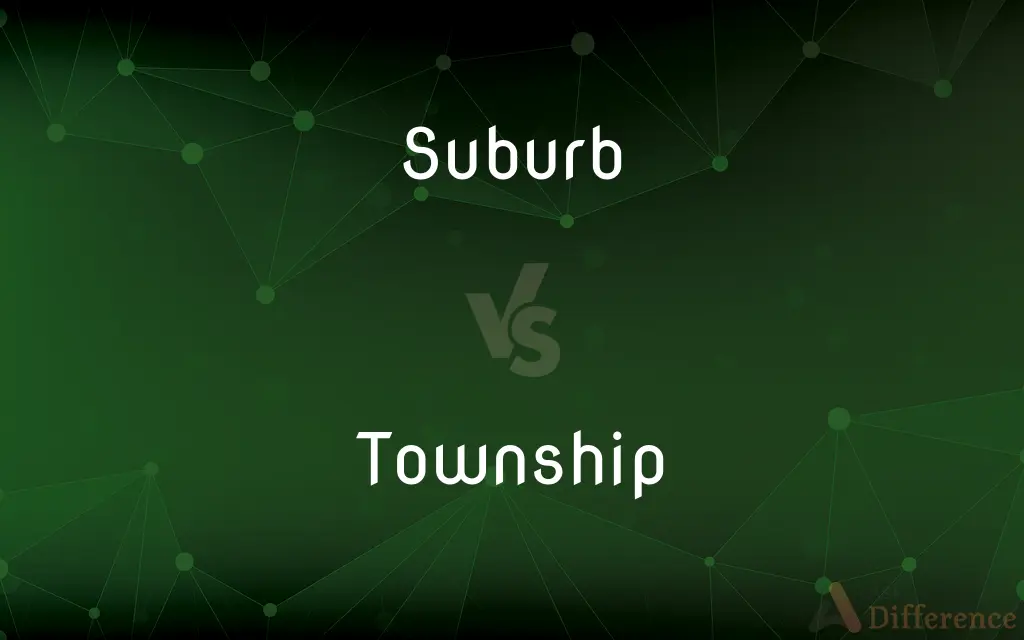Suburb vs. Township — What's the Difference?
Edited by Tayyaba Rehman — By Urooj Arif — Updated on March 2, 2024
A suburb is a residential area located on the outskirts of a city, offering a blend of urban and rural qualities, whereas a township refers to a specific administrative division within a county or state, often encompassing both urban and rural areas.

Difference Between Suburb and Township
Table of Contents
ADVERTISEMENT
Key Differences
Suburbs are primarily residential areas situated on the edges of cities or large towns. They are known for their quieter, more spacious environment compared to the urban core, often with single-family homes, parks, and local businesses catering to residents' needs. Townships, in contrast, are administrative divisions used in several countries, including the United States and Canada, to manage local governance and services. The specifics of a township's role and powers can vary significantly by jurisdiction. In some areas, townships are rural, providing basic services like road maintenance and local zoning. In others, they are more urbanized and offer a wider range of services, possibly including their own school systems, police, and fire departments.
Suburbs provide a compromise between urban amenities and the tranquility of rural living, attracting families and individuals seeking a less congested living space with access to city jobs and resources.
Townships may contain a mix of residential, commercial, and agricultural areas, depending on their location and development.
While suburbs are defined by their location and residential character, townships are defined by their governmental role and administrative boundaries. A suburb may be part of a larger city or metropolitan area's residential planning, often without distinct governmental powers. On the other hand, a township usually has a defined set of responsibilities and authorities granted by the state or provincial government, including taxation, infrastructure maintenance, and local ordinance enforcement.
The development of suburbs is often driven by population growth, urban sprawl, and the desire for homeownership and space, leading to the expansion of cities outward. Township development and organization, however, are influenced by historical land division practices, governance needs, and local community requirements, establishing structured areas for management and service provision.
ADVERTISEMENT
Both suburbs and townships contribute to the broader urban landscape, their distinctions lie in their purpose, structure, and the role they play within the framework of urban and rural development. Suburbs are primarily residential extensions of cities, whereas townships are administrative units with varying degrees of autonomy and responsibility for local governance.
Comparison Chart
Definition
Residential area on the outskirts of a city
Administrative division for local governance
Location
Typically adjacent to urban areas
Can be urban, suburban, or rural
Primary Purpose
Residential living with urban amenities
Local governance and service provision
Characteristics
Quieter, more space, family-oriented
Varies widely; can include residential, commercial, and agricultural areas
Governance
Part of a larger city or metropolitan area
Has specific local governmental powers
Development
Driven by urban sprawl and housing demand
Influenced by historical land division and local governance needs
Services
Limited to basic community services
Range from basic to comprehensive local services, depending on the jurisdiction
Examples
Suburbs of Chicago, Parisian banlieues
Townships in New Jersey, Ontario townships
Compare with Definitions
Suburb
A residential area near a city.
They moved to a suburb for its peaceful neighborhoods and green spaces.
Township
Can be urban or rural.
The township encompasses both densely populated areas and rural farmland.
Suburb
Known for quieter, spacious living.
The suburb offers a tranquil escape from the city's hustle.
Township
Has varying degrees of autonomy.
Some townships have their own police and fire departments.
Suburb
Blends urban and rural qualities.
This suburb is perfect for those who enjoy both city amenities and countryside peace.
Township
Provides governance and services.
Our township just opened a new community center.
Suburb
Attracts families and professionals.
The suburb has become popular among families looking for good schools and safe streets.
Township
Manages local infrastructure.
Road upgrades and park maintenance are managed by the township.
Suburb
Expands with urban growth.
As the city grows, its suburbs spread further into the surrounding countryside.
Township
A township is some kind of human settlement or administrative subdivision, with its meaning varying in different countries. While the term is occasionally associated with an urban area, this tends to be an exception to the rule.
Suburb
A suburb (or suburban area or suburbia) is a mixed-use or residential area, existing either as part of a city/urban area, or as a separate residential community within commuting distance of one. Suburbs might have their own political or legal jurisdiction, especially in the United States, but this is not always the case, especially in the United Kingdom where most suburbs are located within the administrative boundaries of cities.
Township
A subdivision of a county in most northeast and Midwest US states, having the status of a unit of local government with varying governmental powers.
Suburb
An outlying district of a city, especially a residential one
A highly respectable suburb of Chicago
A working-class suburb
Life is much better in the suburbs
Township
A public land surveying unit of 36 sections or 36 square miles.
Suburb
A usually residential area or community outlying a city.
Township
An ancient administrative division of a large parish in England.
Suburb
Suburbs The usually residential region around a major city; the environs.
Township
An administrative division of a county;
The town is responsible for snow removal
Suburb
A residential area located on the outskirts of a city or large town that usually includes businesses that cater to its residents; such as schools, grocery stores, shopping centers, restaurants, convenience stores, etc.
Township
An administrative division.
The township oversees local road maintenance and zoning laws.
Suburb
(by extension) The outer part; the environment.
Suburb
Any subdivision of a conurbation, not necessarily on the periphery.
Suburb
An outlying part of a city or town; a smaller place immediately adjacent to a city; in the plural, the region which is on the confines of any city or large town; as, a house stands in the suburbs; a garden situated in the suburbs of Paris.
[London] could hardly have contained less than thirty or forty thousand souls within its walls; and the suburbs were very populous.
Common Curiosities
Can a suburb be part of a township?
Yes, a suburb can be located within a township, especially in regions where townships serve as the basic unit of local government.
How does governance differ between suburbs and townships?
Governance in suburbs is typically managed by the city or metropolitan authority they are part of, whereas townships have their own governing bodies with specific local powers.
Why do people choose to live in suburbs?
People often choose suburbs for more space, quieter living environments, and access to both urban job markets and rural leisure activities.
What is the main difference between a suburb and a township?
The main difference lies in their function: suburbs are primarily residential areas near cities, while townships are administrative divisions responsible for local governance.
How do townships affect property taxes?
Townships can levy their own property taxes to fund local services, which may affect overall tax rates for residents within their boundaries.
What services do townships provide?
Services provided by townships vary but can include road maintenance, local zoning, public safety, and sometimes educational services.
Can a suburb have its own government?
Some suburbs may have their own municipal governments if they are incorporated as cities or towns, separate from the central city.
Are townships always smaller than cities?
Not necessarily; the size and population of a township can vary widely, and some townships are larger and more populous than cities.
What role do townships play in urban planning?
Townships play a significant role in local urban planning, managing land use, and development within their administrative areas.
How do residential patterns differ between suburbs and townships?
Suburbs are primarily residential with a focus on single-family homes, while townships may encompass a broader mix of residential, commercial, and agricultural areas.
Share Your Discovery

Previous Comparison
Addicting vs. Addiction
Next Comparison
Blasphemy vs. ProfanityAuthor Spotlight
Written by
Urooj ArifUrooj is a skilled content writer at Ask Difference, known for her exceptional ability to simplify complex topics into engaging and informative content. With a passion for research and a flair for clear, concise writing, she consistently delivers articles that resonate with our diverse audience.
Edited by
Tayyaba RehmanTayyaba Rehman is a distinguished writer, currently serving as a primary contributor to askdifference.com. As a researcher in semantics and etymology, Tayyaba's passion for the complexity of languages and their distinctions has found a perfect home on the platform. Tayyaba delves into the intricacies of language, distinguishing between commonly confused words and phrases, thereby providing clarity for readers worldwide.















































